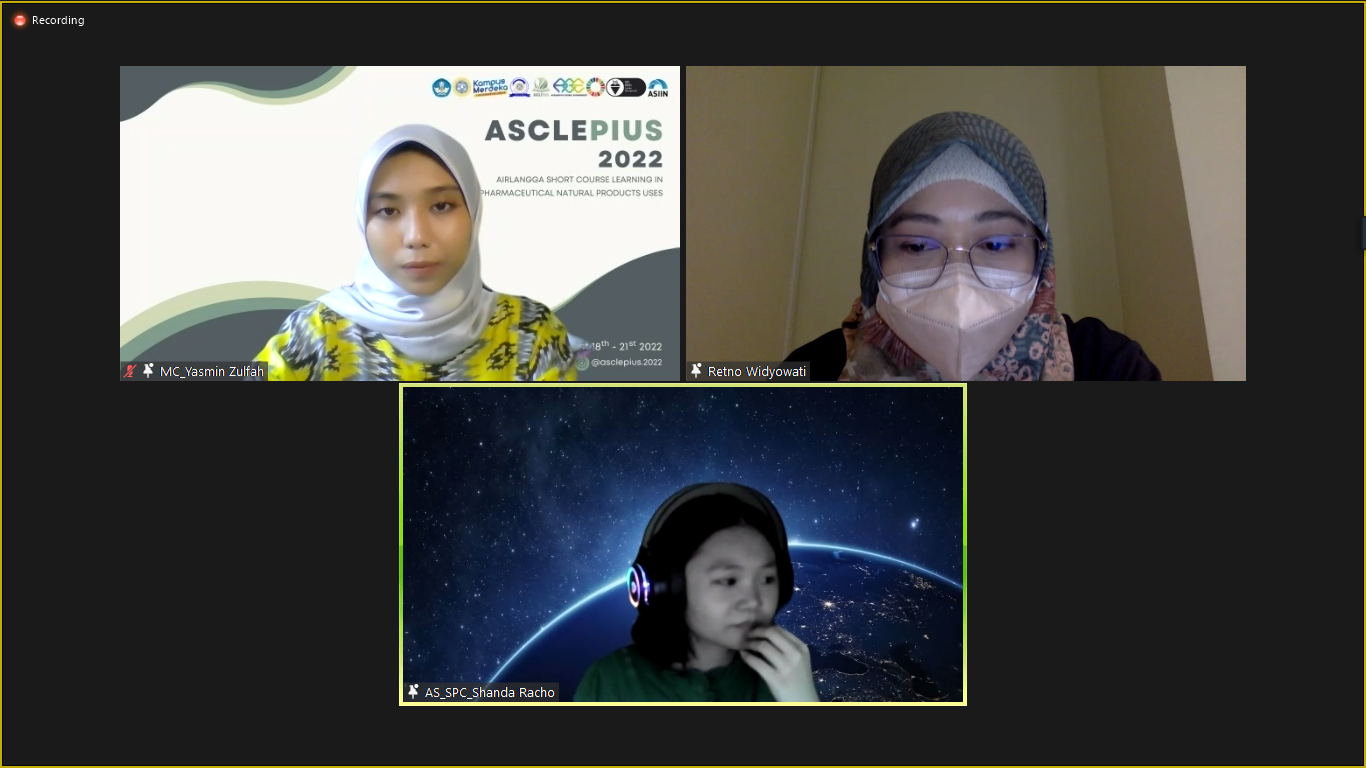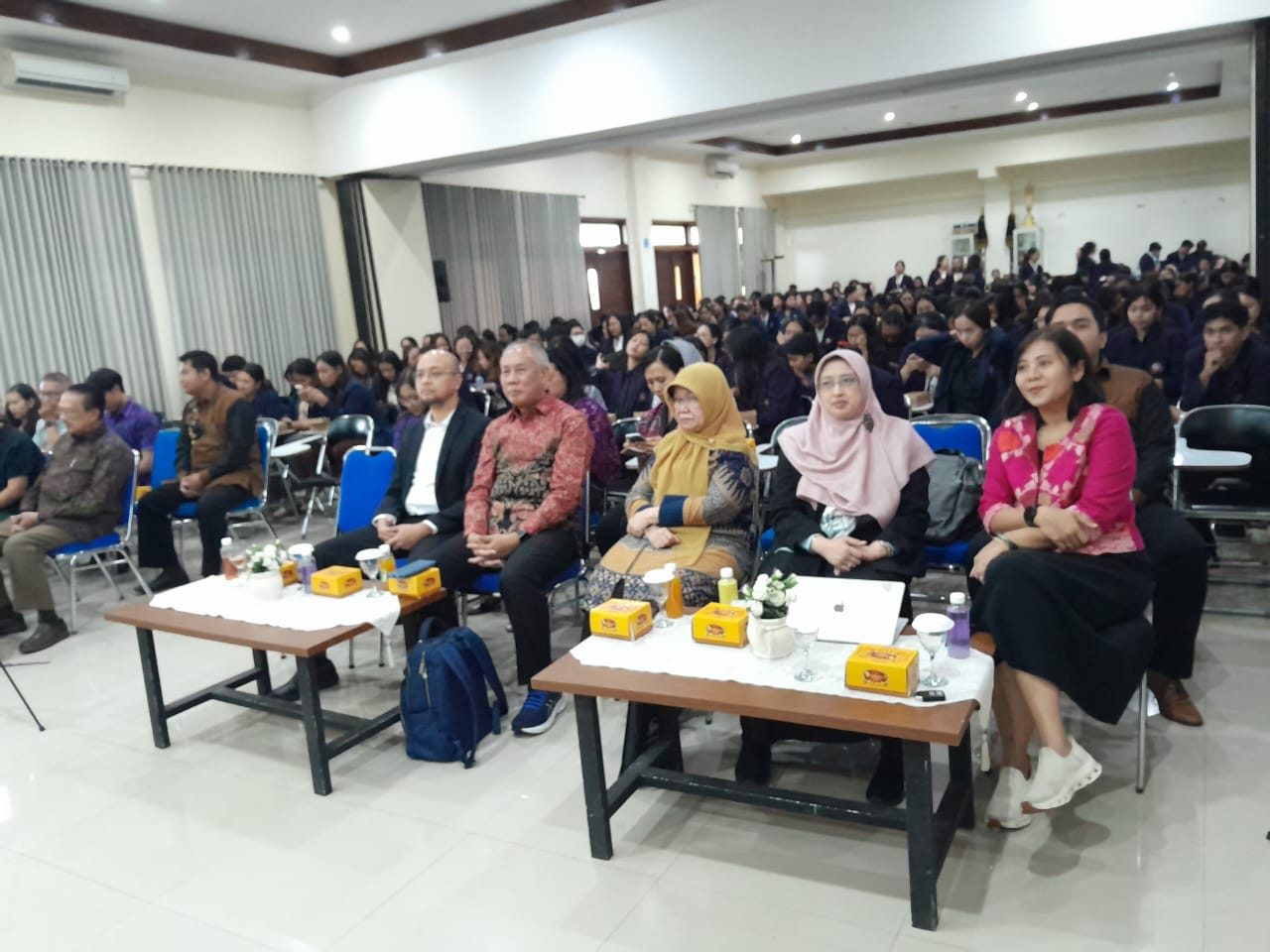
The Student Executive Board of the Faculty of Pharmacy Universitas Airlangga (BEM FF UNAIR) successfully held the Airlangga Short Course Learning in Pharmaceutical Natural Products Uses (ASCLEPIUS) 2022 on August 18-21, 2022 in a hybrid manner. ASCLEPIUS is a series of short courses, discussions and case studies focusing on the sub-themes of Aromatherapy, Herbal Medicine, Herbal Cosmetics. As one of the programs sponsored by Airlangga Global Engagement (AGE), this event presents competent foreign speakers in the field of pharmaceutical herbal products. The participating participants also came from the student level to pharmacists as well as from within and outside the country. The purpose of this program is to introduce innovations in natural products that are safe, affordable, and beneficial for the development of the pharmaceutical world in particular and the world of health in general.
A series of ASCLEPIUS events were opened in conjunction with the opening of the International Summer School by the Association of Indonesian Pharmacy Universities (APTFI). Four public lectures filled the first day of ASCLEPIUS guided by a moderator from the Faculty of Pharmacy, Universitas Airlangga, apt. Suciati, S.Si., M.Phil., Ph.D.
The first speaker, Prof. Dr. apt. Daryono Hadi Tjahjono, M.Sc., Eng from the Bandung Institute of Technology (ITB), Indonesia explained the vital role of universities in efforts to modernize herbal products. The role is in the form of integrating the topic of developing herbal medicines into the pharmacy education curriculum. Furthermore, Dr. Ram Kumar Sahu from the University of Assam, India provides an overview of the conditions for developing aromatherapy from various plants that are rich in essential oils and are widely found in his country.
Prof. Dr. Katsuyoshi Matsunami was the third speaker. The lecturer at Hiroshima University, Japan explained the long history of humans with herbal plants, starting from the prehistoric era to the present. The majority of modern drugs can even be traced to natural ingredients, such as aspirin and morphine. Lastly, Assoc. Prof. Dr. Komkanok Ingkaninan from Naresuan University, Thailand showed the great potential of natural ingredients as cosmetic products. For example, as an active ingredient in whitening, arbutin obtained from strawberries can be used as an alternative to hydroquinone, a compound that has been shown to be toxic to skin color cells.
On the second day, the committee invited participants to do a case study. As a debriefing, participants first heard the presentation of Herbal Medicine material by Dr. apt. Wiwied Ekasari, M.Si. from UNAIR
which introduces herbal medicine as Indonesian cultural heritage which is made from natural ingredients and is proven to be safe and efficacious from generation to generation. FF UNAIR students, Afsy Nadifa and Yasmin Zulfah acted as moderators and guides for the second day of the event.
"Evidence of the existence of herbal medicines has been found in the reliefs of Borobudur Temple and explanations can be found in ancient texts such as Serat Centini," explained Dr. Wiwied in English.
There is not enough empirical evidence, many studies have concluded that the ingredients in herbal medicine are indeed beneficial for health. Bitter medicine made from bitter leaves, for example, has been shown to lower blood sugar levels in diabetic patients.
"However, the thing to note is that the use of herbal medicines must be routine because the active substances contained in low levels," continued Dr. Wiwied.
Next, it was the turn of the UNAIR Professor, Prof. Dr. apt. Mangestuti Agil, MS., for giving a short course on Aromatherapy. Prof. Mangestuti explained, aromatherapy generally comes from plant essential oils. The fragrance produced causes relaxation so that it boosts the body's immune system.
"Research has shown the health benefits of using essential oils from various plants, including antimicrobial, antiseptic, disinfectant, and even anticancer properties," added Prof. Mangestuti.
Regarding how to use it, Prof. Mangestuti suggests using only essential oils to be inhaled as aromatherapy or applied to the skin as an external medicine. Except on the advice and supervision of a health professional, essential oils should not be taken by mouth.
"Some oils contain toxic compounds so that drinking them can be fatal," explained Prof. Mangestuti.
After delivering the two materials, participants conducted a case study on the topic of herbal medicine and aromatherapy. Participants then take turns presenting the results of the case studies and responding to comments given by previous presenters.
The ASCLEPIUS agenda shifted to the third day with the delivery of the third course by Dr. apt. Noorma Rosita, M.Si. regarding Herbal Cosmetics and Related Problems. The moderator and host of the third day, Naila Shafa, invited Dr. Noorma to deliver the third course. Dr. Noorma explained that nowadays, cosmetics have become a basic need for all ages and genders. This condition is caused by public awareness of the benefits of cosmetics in improving aesthetics and slowing down the aging process.
"We see an increase in demand for cosmetic products in Asia-Pacific from 2019 to 2024," said Dr. Noorma.
This increasing demand for cosmetic products paved the way for herbal cosmetic products. According to Dr. Noorma, a lot of natural ingredients, especially from plants that have the potential as cosmetics. Starting from the seeds of grapes that can overcome premature aging to the skin of citrus fruits which are efficacious as whiteners.
Furthermore, participants carried out a case study on the topic of herbal cosmetics with the same mechanism as the second day guided by Yasmin Zulfah as moderator. Participants were then directed to have group discussions and were given the task of making product designs related to the three accepted topics to be presented the next day. In addition, the committee also announced related to the herbal product campaign video competition and videos of cultural offerings from their respective countries that can be followed by participants.
On the last day of the event, all participants presented the results of discussions on the three course topics, namely aromatherapy, herbal medicine, and herbal cosmetics. The presentation was guided by Yasmin Zulfah as moderator. FF UNAIR Pharmacognosy Lecturer apt. Rr. Retno Widyowati, S.Si., M.Pharm., Ph.D. provide feedback after each group after presenting the results of their discussion.
On the sidelines of the agenda, the committee invited participants to play guessing the flags of countries and world celebrities. Participants seemed enthusiastic and managed to answer the questions correctly. Furthermore, the committee invited participants to get to know the City of Surabaya and FF UNAIR through a virtual tour guided by Afsy Nadifa and Naila Shafa. Participants were also presented with videos of cultural presentations from each participant's country of origin who had participated in the ASCLEPIUS event.
The ASCLEPIUS 2022 series of events closed with the announcement of the winners of the best participants, the best participant groups, the best cultural performance videos, and the best product campaign videos. One of the best participants as well as the representative of the best participant group “MEDRINK”, Neeraj Kumar from Assam University, India said that the difficulty in designing group product designs was the preparation of formulations that had to take into account the stability of the ingredients and team coordination to successfully display an attractive and full of product posters. complete product information. In addition, another best participant, Ramya P Archarya from Manipal College of Pharmaceutical Sciences, India was grateful for the opportunity given to showcase Indian music culture and was delighted to be one of the winners of the best cultural performance video. The entire list of winners can be found on the official ASCLEPIUS Instagram account @asclepius.2022.
Reporter : Alfionita (2019), Athallah (2020)
Editor : Titin (2021)
Photographer : Agung (2020)








